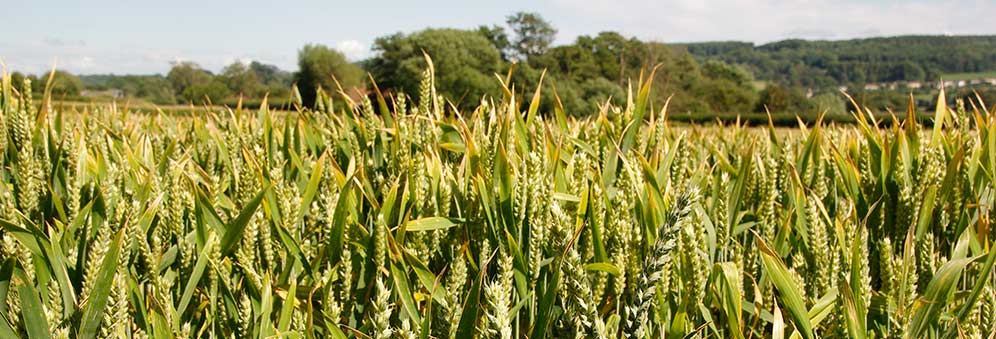Aiding development of high-yield, disease-resistant wheat
Research helps the wheat-breeding industry - vital for global food security - become better able to respond to climate change and population growth.
New genotyping tools developed with the School of Biological Sciences have significantly increased productivity and decreased production costs for an industry worth over £1.8 billion a year.
Breakthrough advances selective breeding approaches
The work has focused on single nucleotide polymorphisms (SNPs), which are regions of DNA between individual chromosomes that vary by a single nucleotide.
“SNPs are the most common type of genetic variation in plant and animal genomes,” explains Professor Keith Edwards, School of Biological Sciences. “This means SNPs are a logical choice for marker-assisted selection – a process used in breeding programmes selecting for traits such as disease resistance and productivity. However, the wheat genome is extremely complex, five times larger than the human genome.”
Previously this complexity has presented significant challenges in SNP discovery, but Edwards’ team has helped overcome them by developing a range of new procedures in next-generation sequencing, bioinformatics and genotyping that have significantly advanced DNA marker assisted breeding approaches.
Commercial partnerships deliver dramatic increase in productivity
It’s a critical breakthrough. The University’s work has contributed significantly to the public release of 95% of the wheat genome, which in turn has allowed rapid uptake of this information by both the academic and commercial wheat-breeding communities.
To make sure the findings are of practical use, the University of Bristol team has also formed alliances with genotyping companies LGC and Affymetrix. This has enabled the development of an integrated package of validated markers and high-throughput genotyping platforms that can deliver data at a considerably reduced cost.
“We’ve put considerable work with both LGC and Affymerix as well as the wheat breeding community to ensure the markers and the genotyping platform are cheap and easy to use" says Edwards. “This makes them ideal for commercial wheat-breeding programmes that focus on development of new high yield and disease resistant varieties.”
Both LGC and Affymetrix now offer these as commercial products, and the commercial impact has been huge. Limagrain – the world’s fifth-largest producer of field seeds – has already benefitted with a ten-fold reduction in costs as well as a ten-fold increase in breeding laboratory throughput. RAGT Seeds, another one of Europe’s leading seeds businesses, has also delivered a five-fold increase in laboratory efficiency, which in turn has doubled rate of genetic gain for traits such as yield, disease resistance and quality.
Ongoing research tackles global food security concerns
Crucially, these commercial benefits are also stimulating further international investment in exploiting the genetic diversity of wheat to improve yields in the face of growing global population and environmental change.
In 2011 the Biotechnology and Biological Sciences Research Council (BBSRC) awarded a £7 million grant to a consortium of researchers, including Professor Edwards, which aims to identify new and useful genetic traits that will improve modern wheat-breeding efforts. This forms part of collaborative ongoing work being undertaken around the globe to try and address concerns over food security, and in particular, fears that human demand for wheat will outstrip supply within the next few decades.
Overall, the contributions made by the researchers at Bristol represent significant advances that will continue to be felt around the world for years to come.
As former Universities and Science Minister David Willetts put it in 2011, it is "an outstanding world class contribution by the UK to the global effort to completely map the wheat genome. By using gene sequencing technology developed in the UK we now have the capability to improve the crops of the future."
Related research groups
 Apply to the SW Biosciences Doctoral Training Partnership
Apply to the SW Biosciences Doctoral Training Partnership
Develop outstanding cross-disciplinary research skills in this unique partnership.
